

Class Ace. Common Core Essentials. Have you heard praise or criticism about the Common Core State Standards (CCSS) and wondered what people were talking about?
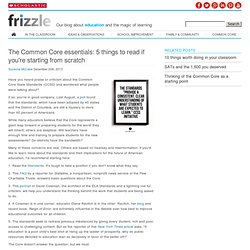
If so, you're in good company. Last August, a poll found that the standards, which have been adopted by 45 states and the District of Columbia, are still a mystery to more than 60 percent of Americans. While many educators believe that the Core represents a giant leap forward in preparing students for the world they will inherit, others are skeptical. Will teachers have enough time and training to prepare students for the new assessments? Do districts have the bandwidth? Many of these concerns are real. 1. 2. 3. 4. 5. The Core doesn't answer the question, but we must. The Common Core: Mathematics. The Common Core State Standards for Mathematics have been adopted by 45 states and the District of Columbia.
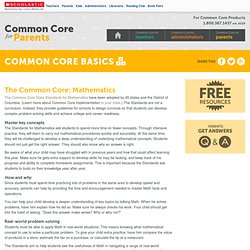
(Learn more about Common Core implementation in your state.) The Standards are not a curriculum. Family Guides. Seek Common Ground and the experts at Student Achievement Partners have created Family Guides to help parents, grandparents, caregivers, friends— anyone helping a child to learn in the 2020-21 school year— understand more about what children should know and be able to do by the end of each grade in literacy and math.
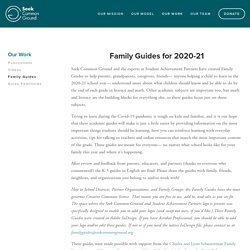
Other academic subjects are important too, but math and literacy are the building blocks for everything else, so these guides focus just on those subjects. Trying to learn during the Covid-19 pandemic is tough on kids and families, and it is our hope that these academic guides will make it just a little easier by providing information on the most important things students should be learning, how you can reinforce learning with everyday activities, tips for talking to teachers and online resources that match the most important content of the grade. For Parents - Everyday Mathematics. Everyday Mathematics at Home Everyday Mathematics at Home provides help with Home and Study Link problems, selected answers, vocabulary definitions, tutorials on algorithms, and games.
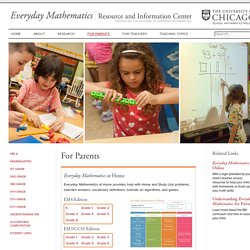
EM4 Edition More in the Parent's section. Fractions are Hard! The truth is that fractions are hard!
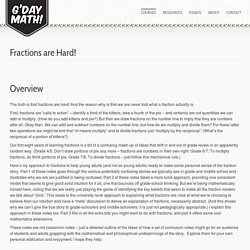
And the reason why is that we are never told what a fraction actually is. First, fractions are “calls to action” – identify a third of the kittens, take a fourth of the pie – and certainly are not quantities we can add or multiply. (How do you add kittens and pie?) But then we draw fractions on the number line to imply that they are numbers after all. Okay then. Great Minds - Parent Tips.
Helping Your Child Learn Mathematics. Maths Ed Ideas. Parent Square Learning Network.
A New Foundation for Student Success. National PTA. NCTM PTA Toolkit. The Ohio Standard. Parent Roadmap. PBS Parents. Spark101. SplashLearn. STEM at Home. Talk To Parents About The Common Core. Sometimes I think we get so busy trying to unpack and implement Common Core that we forget one of our important roles in making this implementation stick: helping our larger communities, especially parents, to understand it, too.
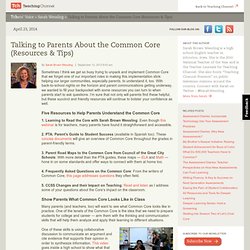
With back-to-school nights on the horizon and parent communications getting underway, we wanted to fill your backpocket with some resources you can turn to when parents start to ask questions. I’m sure that not only will parents find these helpful, but these succinct and friendly resources will continue to bolster your confidence as well.
Five Resources to Help Parents Understand the Common Core 1. Learning to Read the Core with Sarah Brown Wessling: Even though this webinar is for teachers, many parents have found it straightforward and accessible. 2. 3. 4. 5. Teaching Channel. The Case Against Acceleration by: Robert Kaplinsky - If you think others need to see this, share it on one of the sites below by clicking on the button.

Earlier this year I received an email from a first year math teacher who told me that he was teaching a class for 6th graders that covered three years of mathematics standards (6th, 7th, and 8th grade) in one year! The teacher was stressed out because he didn’t know how to teach three years of math in a single year and was falling behind his colleagues.
He saw that there were gaps in students’ understandings and wanted to take the time to address them. He felt like he was doing something wrong, when in reality that was far from the case. I figured that I must have misread his email. In the conversations that ensued, I heard from people all over the United States who worked in districts where this was happening too. TouchMath. Visual Model Progressions. What Do Parents Need to Know. Why early math is just as important as early reading. What grade do U.S. preschools deserve in math instruction?
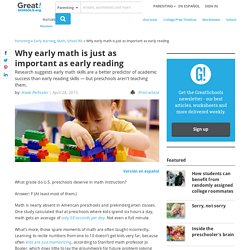
Answer: F (At least most of them.) Math is nearly absent in American preschools and prekindergarten classes. One study calculated that at preschools where kids spend six hours a day, math gets an average of only 58 seconds per day. Not even a full minute. What’s more, those spare moments of math are often taught incorrectly. From “Talk, Read, Sing!” “Early math skills have the greatest predictive power, followed by reading and then attention skills,” reports a psychology squad led by Greg J.